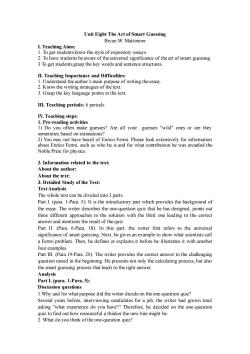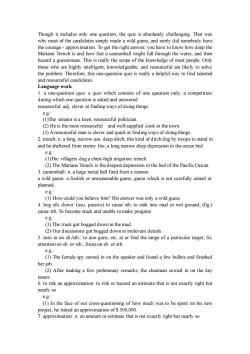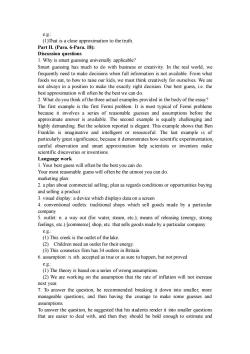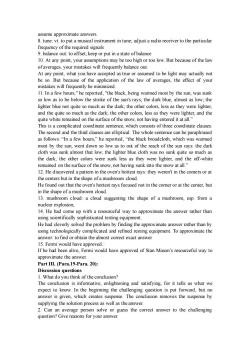《高级英语》课程授课教案(第五册)Unit 8 The Art of Smart Guessing Bryan W. Mattimore

Unit Eight The Art of Smart Guessing Bryan W.Mattimore I.Teaching Aims: 1.To get students know the style of expository essays. 2.To have students be aware of the universal significance of the art of smart guessing. 3 To get students grasp the key words and sentence structures. II.Teaching Importance and Difficulties: 1.Understand the author's main purpose of writing the essay. 2.Know the writing strategies of the text. 3.Grasp the key language points in the text. III.Teaching periods:6 periods IV.Teaching steps: 1.Pre-reading activities 1)Do you often make guesses?Are all your guesses "wild"ones or are they sometimes based on estimations? 2)You may not have heard of Enrico Fermi.Please look extensively for information about Enrico Fermi,such as who he is and for what contribution he was awarded the Noble Prize for physics. 2.Information related to the text: About the author: About the text: 3.Detailed Study of the Text: Text Analysis The whole text can be divided into 3 parts. Part I.(para.1-Para.5):It is the introductory part which provides the background of the essay.The writer describes the one-question quiz that he has designed,points out three different approaches to the solution with the third one leading to the correct answer and mentions the result of the quiz. Part II.(Para.6-Para.18):In this part,the writer first refers to the universal significance of smart guessing.Next,he gives an example to show what scientists call a Fermi problem.Then,he defines or explains it before he illustrates it with another four examples. Part III.(Para.19-Para.20):The writer provides the correct answer to the challenging question raised in the beginning.He presents not only the calculating process,but also the smart guessing process that leads to the right answer. Analysis Part I.(para.1-Para.5): Discussion questions 1.Why and for what purpose did the writer decide on the one-question quiz? Several years before,interviewing candidates for a job,the writer had grown tired asking "what experience do you have?"Therefore,he decided on the one-question quiz to find out how resourceful a thinker the new hire might be. 2.What do you think of the one-question quiz?
Unit Eight The Art of Smart Guessing Bryan W. Mattimore I. Teaching Aims: 1. To get students know the style of expository essays. 2. To have students be aware of the universal significance of the art of smart guessing. 3 To get students grasp the key words and sentence structures. II. Teaching Importance and Difficulties: 1. Understand the author’s main purpose of writing the essay. 2. Know the writing strategies of the text. 3. Grasp the key language points in the text. III. Teaching periods: 6 periods IV. Teaching steps: 1. Pre-reading activities 1) Do you often make guesses? Are all your guesses "wild" ones or are they sometimes based on estimations? 2) You may not have heard of Enrico Fermi. Please look extensively for information about Enrico Fermi, such as who he is and for what contribution he was awarded the Noble Prize for physics. 2. Information related to the text: About the author: About the text: 3. Detailed Study of the Text: Text Analysis The whole text can be divided into 3 parts. Part I. (para. 1-Para. 5): It is the introductory part which provides the background of the essay. The writer describes the one-question quiz that he has designed, points out three different approaches to the solution with the third one leading to the correct answer and mentions the result of the quiz. Part II. (Para. 6-Para. 18): In this part, the writer first refers to the universal significance of smart guessing. Next, he gives an example to show what scientists call a Fermi problem. Then, he defines or explains it before he illustrates it with another four examples. Part III. (Para.19-Para. 20): The writer provides the correct answer to the challenging question raised in the beginning. He presents not only the calculating process, but also the smart guessing process that leads to the right answer. Analysis Part I. (para. 1-Para. 5): Discussion questions 1.Why and for what purpose did the writer decide on the one-question quiz? Several years before, interviewing candidates for a job, the writer had grown tired asking "what experience do you have?" Therefore, he decided on the one-question quiz to find out how resourceful a thinker the new hire might be. 2. What do you think of the one-question quiz?

Though it includes only one question,the quiz is absolutely challenging.That was why most of the candidates simply made a wild guess,and rarely did somebody have the courage-approximation.To get the right answer,you have to know how deep the Mariana Trench is and how fast a cannonball might fall through the water,and then hazard a guesstimate.This is really the scope of the knowledge of most people.Only those who are highly intelligent,knowledgeable,and resourceful are likely to solve the problem.Therefore,this one-question quiz is really a helpful way to find talented and resourceful candidates. Language work 1.a one-question quiz:a quiz which consists of one question only;a competition during which one question is asked and answered resourceful:adj.clever at finding ways of doing things e.g.: (1)The senator is a keen,resourceful politician. (2)He is the most resourceful and well-supplied cook in the town. (3)A resourceful man is clever and quick at finding ways of doing things. 2.trench:n.a long,narrow usu.deep ditch;this kind of ditch dug by troops to stand in and be sheltered from enemy fire;a long narrow deep depression in the ocean bed e.g.: (1)The villagers dug a chest-high irrigation trench. (2)The Mariana Trench is the deepest depression in the bed of the Pacific Ocean. 3.cannonball:n.a large metal ball fired from a cannon a wild guess:a foolish or unreasonable guess;guess which is not carefully aimed or planned. e.g.: (1)How could you believe him?His answer was only a wild guess. 4.bog sth.down:(usu.passive)to cause sth.to sink into mud or wet ground;(fig.) cause sth.To become stuck and unable to make progress e.g.: (1)The truck got bogged down in the mud. (2)Our discussions got bogged down in irrelevant details. 5.zero in on sb./sth.:to aim guns,etc.at or find the range of a particular target;fix attention on sb.or sth.;focus on sb.or sth. e.g.: (1)The female spy zeroed in on the speaker and found a few bullets and finished her job. (2)After making a few preliminary remarks,the chairman zeroed in on the key Issues. 6.to risk an approximation:to risk or hazard an estimate that is not exactly right but nearly so e.g.: (1)In the face of our cross-questioning of how much was to be spent on his new project,he risked an approximation of$500,000. 7.approximation:n.an amount or estimate that is not exactly right but nearly so
Though it includes only one question, the quiz is absolutely challenging. That was why most of the candidates simply made a wild guess, and rarely did somebody have the courage - approximation. To get the right answer, you have to know how deep the Mariana Trench is and how fast a cannonball might fall through the water, and then hazard a guesstimate. This is really the scope of the knowledge of most people. Only those who are highly intelligent, knowledgeable, and resourceful are likely to solve the problem. Therefore, this one-question quiz is really a helpful way to find talented and resourceful candidates. Language work 1. a one-question quiz: a quiz which consists of one question only; a competition during which one question is asked and answered resourceful: adj. clever at finding ways of doing things e.g.: (1)The senator is a keen, resourceful politician. (2) He is the most resourceful and well-supplied cook in the town. (3) A resourceful man is clever and quick at finding ways of doing things. 2. trench: n. a long, narrow usu. deep ditch; this kind of ditch dug by troops to stand in and be sheltered from enemy fire; a long narrow deep depression in the ocean bed e.g.: (1)The villagers dug a chest-high irrigation trench. (2) The Mariana Trench is the deepest depression in the bed of the Pacific Ocean. 3. cannonball: n. a large metal ball fired from a cannon a wild guess: a foolish or unreasonable guess; guess which is not carefully aimed or planned. e.g.: (1) How could you believe him? His answer was only a wild guess. 4. bog sth. down: (usu. passive) to cause sth. to sink into mud or wet ground; (fig.) cause sth. To become stuck and unable to make progress e.g.: (1) The truck got bogged down in the mud. (2) Our discussions got bogged down in irrelevant details. 5. zero in on sb./sth.: to aim guns, etc. at or find the range of a particular target; fix attention on sb. or sth.; focus on sb. or sth. e.g.: (1) The female spy zeroed in on the speaker and found a few bullets and finished her job. (2) After making a few preliminary remarks, the chairman zeroed in on the key issues. 6. to risk an approximation: to risk or hazard an estimate that is not exactly right but nearly so e.g.: (1) In the face of our cross-questioning of how much was to be spent on his new project, he risked an approximation of $ 500,000. 7. approximation: n. an amount or estimate that is not exactly right but nearly so

e.g.: (1)That is a close approximation to the truth. Part II.(Para.6-Para.18): Discussion questions 1.Why is smart guessing universally applicable? Smart guessing has much to do with business or creativity.In the real world,we frequently need to make decisions when full information is not available.From what foods we eat,to how to raise our kids,we must think creatively for ourselves.We are not always in a position to make the exactly right decision.Our best guess,i.e.the best approximation will often be the best we can do. 2.What do you think of the three actual examples provided in the body of the essay? The first example is the first Fermi problem.It is most typical of Fermi problems because it involves a series of reasonable guesses and assumptions before the approximate answer is available.The second example is equally challenging and highly demanding.But the solution reported is elegant.This example shows that Ben Franklin is imaginative and intelligent or resourceful.The last example is of particularly great significance,because it demonstrates how scientific experimentation, careful observation and smart approximation help scientists or inventors make scientific discoveries or inventions. Language work 1.Your best guess will often be the best you can do. Your most reasonable guess will often be the utmost you can do. marketing plan: 2.a plan about commercial selling;plan as regards conditions or opportunities buying and selling a product 3.visual display:a device which displays data on a screen 4.conventional outlets:traditional shops which sell goods made by a particular company 5.outlet:n.a way out (for water,steam,etc.);means of releasing (energy,strong feelings,etc.)[commerce]shop,etc.that sells goods made by a particular company e.g.: (1)This creek is the outlet of the lake. (2)Children need an outlet for their energy. (3)This cosmetics firm has 34 outlets in Britain. 6.assumption:n.sth.accepted as true or as sure to happen,but not proved e.g.: (1)The theory is based on a series of wrong assumptions. (2)We are working on the assumption that the rate of inflation will not increase next year. 7.To answer the question,he recommended breaking it down into smaller,more manageable questions,and then having the courage to make some guesses and assumptions. To answer the question,he suggested that his students render it into smaller questions that are easier to deal with,and then they should be bold enough to estimate and
e.g.: (1)That is a close approximation to the truth. Part II. (Para. 6-Para. 18): Discussion questions 1. Why is smart guessing universally applicable? Smart guessing has much to do with business or creativity. In the real world, we frequently need to make decisions when full information is not available. From what foods we eat, to how to raise our kids, we must think creatively for ourselves. We are not always in a position to make the exactly right decision. Our best guess, i.e. the best approximation will often be the best we can do. 2. What do you think of the three actual examples provided in the body of the essay? The first example is the first Fermi problem. It is most typical of Fermi problems because it involves a series of reasonable guesses and assumptions before the approximate answer is available. The second example is equally challenging and highly demanding. But the solution reported is elegant. This example shows that Ben Franklin is imaginative and intelligent or resourceful. The last example is of particularly great significance, because it demonstrates how scientific experimentation, careful observation and smart approximation help scientists or inventors make scientific discoveries or inventions. Language work 1. Your best guess will often be the best you can do. Your most reasonable guess will often be the utmost you can do. marketing plan: 2. a plan about commercial selling; plan as regards conditions or opportunities buying and selling a product 3. visual display: a device which displays data on a screen 4. conventional outlets: traditional shops which sell goods made by a particular company 5. outlet: n. a way out (for water, steam, etc.); means of releasing (energy, strong feelings, etc.) [commerce] shop, etc. that sells goods made by a particular company e.g.: (1) This creek is the outlet of the lake. (2) Children need an outlet for their energy. (3) This cosmetics firm has 34 outlets in Britain. 6. assumption: n. sth. accepted as true or as sure to happen, but not proved e.g.: (1) The theory is based on a series of wrong assumptions. (2) We are working on the assumption that the rate of inflation will not increase next year. 7. To answer the question, he recommended breaking it down into smaller, more manageable questions, and then having the courage to make some guesses and assumptions. To answer the question, he suggested that his students render it into smaller questions that are easier to deal with, and then they should be bold enough to estimate and

assume approximate answers. 8.tune:vt.to put a musical instrument in tune;adjust a radio receiver to the particular frequency of the required signals 9.balance out:to offset;keep or put in a state of balance 10.At any point,your assumptions may be too high or too low.But because of the law of averages,your mistakes will frequently balance out. At any point,what you have accepted as true or assumed to be light may actually not be so.But because of the application of the law of averages,the effect of your mistakes will frequently be minimized. 11.In a few hours,"he reported,"the black,being warmed most by the sun,was sunk so low as to be below the stroke of the sun's rays;the dark blue,almost as low;the lighter blue not quite so much as the dark;the other colors,less as they were lighter, and the quite so much as the dark;the other colors,less as they were lighter,and the quite white remained on the surface of the snow,not having entered it at all." This is a complicated coordinate sentence,which consists of three coordinate clauses. The second and the third clauses are elliptical.The whole sentence can be paraphrased as follows:"In a few hours,"he reported,"the black broadcloth,which was warmed most by the sun,went down so low as to out of the reach of the sun rays:the dark cloth was sunk almost that low;the lighter blue cloth was no sunk quite so much as the dark;the other colors were sunk less as they were lighter,and the off-white remained on the surface of the snow,not having sunk into the snow at all." 12.He discovered a pattern in the oven's hottest rays:they weren't in the comers or at the centers but in the shape of a mushroom cloud. He found out that the oven's hottest rays focused not in the corner or at the center,but in the shape of a mushroom cloud. 13.mushroom cloud:a cloud suggesting the shape of a mushroom,esp.from a nuclear explosion; 14.He had come up with a resourceful way to approximate the answer rather than using scientifically sophisticated testing equipment. He had cleverly solved the problem by finding the approximate answer rather than by using technologically complicated and refined resting equipment.To approximate the answer:to find or obtain the almost correct exact answer 15.Fermi would have approved.: If he had been alive,Fermi would have approved of Stan Mason's resourceful way to approximate the answer. Part III.(Para.19-Para.20): Discussion questions 1.What do you think of the conclusion? The conclusion is informative,enlightening and satisfying,for it tells us what we expect to know.In the beginning the challenging question is put forward,but no answer is given,which creates suspense.The conclusion removes the suspense by supplying the solution process as well as the answer. 2.Can an average person solve or guess the correct answer to the challenging question?Give reasons for your answer
assume approximate answers. 8. tune: vt. to put a musical instrument in tune; adjust a radio receiver to the particular frequency of the required signals 9. balance out: to offset; keep or put in a state of balance 10. At any point, your assumptions may be too high or too low. But because of the law of averages, your mistakes will frequently balance out. At any point, what you have accepted as true or assumed to be light may actually not be so. But because of the application of the law of averages, the effect of your mistakes will frequently be minimized. 11. In a few hours," he reported, "the black, being warmed most by the sun, was sunk so low as to be below the stroke of the sun's rays; the dark blue, almost as low; the lighter blue not quite so much as the dark; the other colors, less as they were lighter, and the quite so much as the dark; the other colors, less as they were lighter, and the quite white remained on the surface of the snow, not having entered it at all.” This is a complicated coordinate sentence, which consists of three coordinate clauses. The second and the third clauses are elliptical. The whole sentence can be paraphrased as follows: “In a few hours,” he reported, “the black broadcloth, which was warmed most by the sun, went down so low as to out of the reach of the sun rays: the dark cloth was sunk almost that low; the lighter blue cloth was no sunk quite so much as the dark; the other colors were sunk less as they were lighter, and the off-white remained on the surface of the snow, not having sunk into the snow at all.” 12. He discovered a pattern in the oven's hottest rays: they weren't in the comers or at the centers but in the shape of a mushroom cloud. He found out that the oven's hottest rays focused not in the corner or at the center, but in the shape of a mushroom cloud. 13. mushroom cloud: a cloud suggesting the shape of a mushroom, esp. from a nuclear explosion; 14. He had come up with a resourceful way to approximate the answer rather than using scientifically sophisticated testing equipment. He had cleverly solved the problem by finding the approximate answer rather than by using technologically complicated and refined resting equipment. To approximate the answer: to find or obtain the almost correct exact answer 15. Fermi would have approved.: If he had been alive, Fermi would have approved of Stan Mason’s resourceful way to approximate the answer. Part III. (Para.19-Para. 20): Discussion questions 1. What do you think of the conclusion? The conclusion is informative, enlightening and satisfying, for it tells us what we expect to know. In the beginning the challenging question is put forward, but no answer is given, which creates suspense. The conclusion removes the suspense by supplying the solution process as well as the answer. 2. Can an average person solve or guess the correct answer to the challenging question? Give reasons for your answer

No,it is impossible for an ordinary person to find the right answer because it is not likely for him to know the depth of the Mariana Trench or the falling rate of a cannonball dropping through water.And it is absolutely out of the question for him to guesstimate the correct answer.Only those who are imaginative,knowledgeable and resourceful like the writer of the text are capable of solving the Fermi problem
No, it is impossible for an ordinary person to find the right answer because it is not likely for him to know the depth of the Mariana Trench or the falling rate of a cannonball dropping through water. And it is absolutely out of the question for him to guesstimate the correct answer. Only those who are imaginative, knowledgeable and resourceful like the writer of the text are capable of solving the Fermi problem
按次数下载不扣除下载券;
注册用户24小时内重复下载只扣除一次;
顺序:VIP每日次数-->可用次数-->下载券;
- 《高级英语》课程授课教案(第五册)Unit 5 Force of Nature Barbara Goldsmith.doc
- 《高级英语》课程授课教案(第五册)Unit 4 The Girl in the Fifth Row Leo Buscaglia.doc
- 《高级英语》课程授课教案(第五册)Unit 1 The Fourth of July.doc
- 石河子大学:《俄语语法》课程教学资源(试卷习题)俄语语法(二)期末考试B卷答案.doc
- 石河子大学:《俄语语法》课程教学资源(试卷习题)俄语语法(二)期末考试B卷.doc
- 石河子大学:《俄语语法》课程教学资源(试卷习题)俄语语法(二)期末考试A卷答案.doc
- 石河子大学:《俄语语法》课程教学资源(试卷习题)俄语语法(二)期末考试A卷.doc
- 石河子大学:《俄语语法》课程教学资源(试卷习题)语法(二)期中考试答案.doc
- 石河子大学:《俄语语法》课程教学资源(试卷习题)语法(二)期中考试.doc
- 石河子大学:《俄语语法》课程教学资源(试卷习题)2013-2014俄语语法(三)期中答案.doc
- 石河子大学:《俄语语法》课程教学资源(试卷习题)2013-2014俄语语法(三)期中卷.doc
- 《俄语语法》课程教学大纲四(理论含实践课)Russian grammar Ⅳ.doc
- 《俄语语法》课程教学大纲二(理论含实践课)Russian grammar Ⅱ.doc
- 《俄语语法》课程教学大纲三(理论含实践课)Russian grammar Ⅲ.doc
- 《俄语语法》课程教学大纲一(理论含实践课)Russian grammar Ⅰ.doc
- 《俄语语法》课程教学资源(学习资料)俄语中各专业方向所要掌握的关键、主要内容.doc
- 《俄语语法》课程教学资源(学习资料)名词、前置词的用法.doc
- 《俄语语法》课程教学资源(学习资料)俄语中数的资料.doc
- 《俄语语法》课程教学资源(学习资料)动词的用法.doc
- 《俄语语法》课程教学资源(学习资料)代词、形容词、数词的用法.doc
- 《高级英语》课程授课教案(第五册)Unit 9 Pigskin English Robert MacNeil.doc
- 《高级英语》课程授课教案(第五册)Unit 2 The Struggle to Be an All-American Girl Elizabeth Wong.doc
- 《高级英语》课程授课教案(第五册)Unit 3 A Hanging George Orwell.doc
- 《高级英语》课程授课教案(第五册)Unit 6 Give me Liberty or Give me Death Patrick Henry.doc
- 《高级英语》课程授课教案(第五册)Unit 7 How America Lives James A. Michener.doc
- 《高级英语》课程授课教案(第五册)Unit 10 Love and Resentment Barbara Bick.doc
- 《高级英语》课程授课教案(第六册)Unit 1 Technology in Reverse Robert J. Samuelson.doc
- 《高级英语》课程授课教案(第六册)Unit 4 Disney World - Cities of Simulation as Postmodern Utopias Ken Sanes.doc
- 《高级英语》课程授课教案(第六册)Unit 5 What Are Our Real Values? By Nicols Fox.doc
- 《高级英语》课程授课教案(第六册)Unit 9 I’d Rather Be Black Than Female Shirley Chisholm.doc
- 《高级英语》课程授课教案(第六册)Unit 2 A Class Act Florence Cartlidge.doc
- 《高级英语》课程授课教案(第六册)Unit 3 Bards of the Internet By Phillip Elmer-Dewitt.doc
- 《高级英语》课程授课教案(第六册)Unit 7 A Few Kind Words for Superstition Robertson Davies.doc
- 《高级英语》课程授课教案(第六册)Unit 8 Being There Anatole Broyard.doc
- 《高级英语》课程授课教案(第六册)Unit 6 Matriculation Fixation Joe Queenan.doc
- 《高级英语》课程授课教案(第六册)Unit 10 Two Truths to Live By Alexander M. Schindler.doc
- 《高级英语》课程教学资源(试卷习题)第一套试卷(试题).doc
- 《高级英语》课程教学资源(试卷习题)第三套试卷(试题).doc
- 《高级英语》课程教学资源(试卷习题)第二套试卷(试题).doc
- 《高级英语》课程教学资源(试卷习题)第五套试卷(试题).doc
